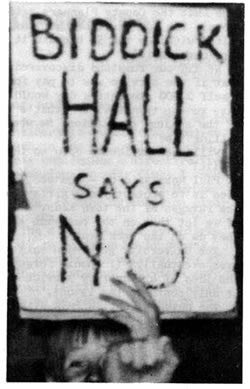
 |
Online
Archive
|
| Issue 8 - November 1972 |
| Biddick Hall Says No |
|
In June of this year the South Shields Trades Union Council made a decision to oppose the Housing Finance Bill. This decision was acted upon using techniques which have proved to be effective over a range of issues and for which the SS Trades Union Council has developed something of a reputation as in its campaigns for students, pensioners, and during the miners and dockers strikes. An analysis of action to date brings out 5 basic principles upon which effective grass root campaigns depend: 1 The campaign must involve a specific issue genuinely affecting
those it is intended to involve in the campaign. Direct action must
be possible by these individuals acting as a group. There must therefore
be a realistic appreciation of the practical objectives of the campaign
and an assessment of what particular action is expected from individuals. 2 A thorough campaign of agitation and education must be mounted
to ensure emotional and intellectual involvement in the issue. 
3 Organisations must be created at grass root level. All existing
organisations are likely to be too rigid or too conservative to be effective.
Existing leaders are likely to be suspect and new leaders must be allowed
to rise. 4 Political parties should NOT be involved or included in the
organisations as such. Party members should be involved only on a non-party
basis. One of the most characteristic features of public meetings of
tenants has been the insistence of "keeping political parties out"
- even when expressing such obviously political views as opposition
to the Industrial Relations Act or the Rent Act. Thus while politically
motivated individuals are necessary for sustained efforts to promote
action they must be capable of sinking their long-term philosophy in
the short-term interests of a narrow objective. 5 Trades union involvement should be sought at all levels. This
should include union branches and trades councils, and, if national
indications can be developed, the TUC involvement should include financial
and organisational support, and ultimately the threat of supporting
industrial action. Due to the temporary resistance to the Rent Act by the South Shields Town Council, rent increases have not yet been imposed on council houses. However, despite a demonstration by about 400 tenants outside the Town Hall, the Council recently decided on a free vote to implement the Act. This means that in about six weeks' time council tenants on nine estates will join the 130 tenants on North-East Housing Association estates who are not paying the increase in their rent. |